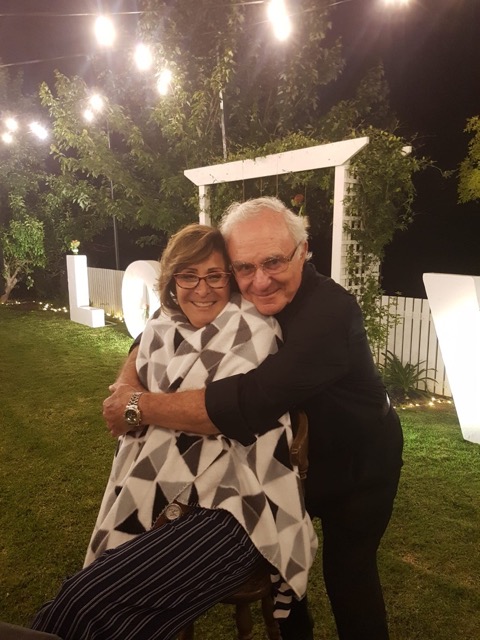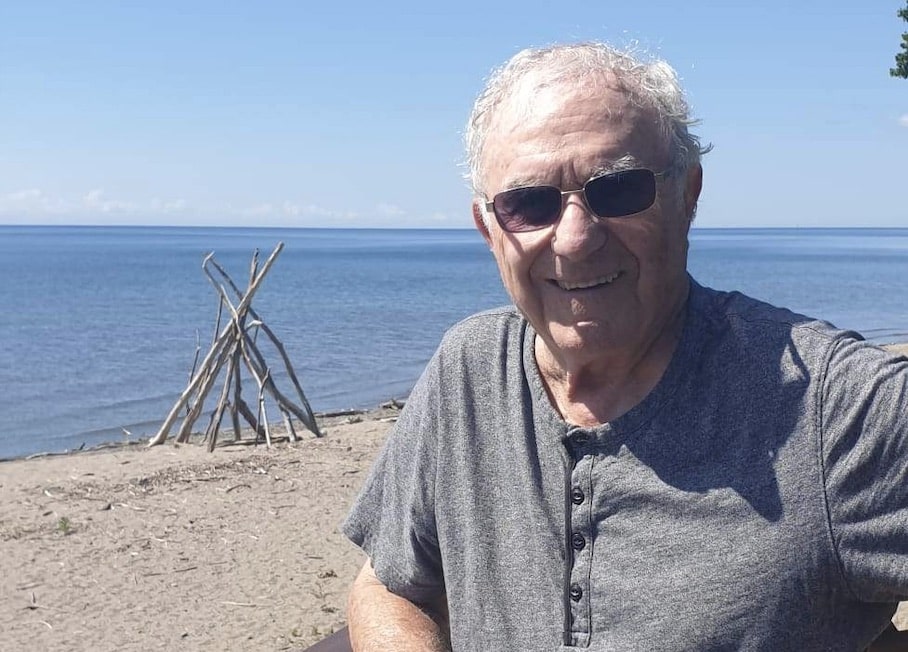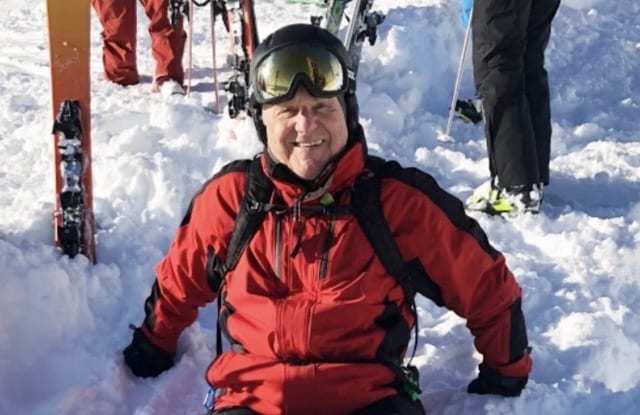While Zelik “Zel” Bocknek didn’t have major memory issues, brain scans revealed he had the beta-amyloid plaque needed to take part in the lecanemab clinical trial. Now 90 and still on Leqembi, Zelik shares his experience with the trial and how he’s continuing to live an active life.
This article is part of the Journey to Diagnosis series, produced by Being Patient with support provided by Eli Lilly.
In the newest definition of Alzheimer’s disease, biomarkers are the focus of diagnosis, not the symptoms. This definition has drawn criticism, especially since there are people with amyloid plaque who never develop symptoms. People with Alzheimer’s diagnoses like Zelik “Zel” Bocknek, a retired business owner in Toronto, exist somewhere between these definitions. When he went for cognitive testing after seeing his brother decline, he was experiencing only minor memory issues. However, brain scans revealed Zelik Bocknek had the beta-amyloid plaques needed to take part in the the Leqembi (generic name lecanemab) trial he later took part in.
So, what can monoclonal antibody drugs like Leqembi do for people with Alzheimer’s biomarkers but minimal symptoms?
For Zelik Bocknek, taking part in the trial and continuing to take Leqembi for three and a half years has meant that he can continue living an active, socially engaged life. One that includes doing things like downhill skiing and volunteering at the Toronto Zoo, without worrying about declining further.
Zelik Bocknek and his wife, Gail Bocknek, joined Being Patient Founder Deborah Kan to discuss his experience with Leqembi and how he’s still active at 90.
Read or watch the conversation below.
Being Patient: Zel, what’s your perspective on living with Alzheimer’s disease?
Zelik Bocknek: I’m not suffering. A lot of people are suffering, but I have memory loss. I can’t remember names [and] things that come up that I try to remember. I wake up in the middle of the night, and I remember, so I have that sort of thing going on.
One thing my wife said early on to the people from the Toronto Memory Organization is, “When Zelik turned 50, his three sons got him a new birthday present, and it was a license plate that said, ‘I Forget.’ He was like that when he was 50 and hasn’t changed since.”
Being Patient: Were you in your 80s when you got diagnosed with Alzheimer’s disease?
Bocknek: When I turned 84, I had a brother who was a lawyer [and] a judge, and about two years after he retired from judging, he started to deteriorate. No one knew really what, and at that stage, what was wrong with them. He lived with his wife for a few years, and then it got to the point where she couldn’t handle him anymore.
He was dangerous, and he went to Baycrest Hospital, and there he deteriorated until he didn’t know who he was, who we were, and he couldn’t take care of himself. That was a great concern to me. I didn’t want to experience that if I could avoid it.
We had heard of the Toronto Memory Organization and called and talked with them. They invited and said, “Why don’t you come down?” We went down there and they talked to us, and they gave me some little tests. Then they said, “Would you like to join the program [for the lecanemab clinical trial]?”
[They asked] especially because I was about four and a half months [away] from 85. No one [had volunteered who was] 85 or older, so I would end up being the oldest person to volunteer. I said yes, and so for the first year and a half, I was on the infusion every two weeks. No one could tell me whether I was getting anything or if I was on the neutral stuff.

Being Patient: At this point, you began taking part in the lecanemab clinical trial with the Toronto Memory Clinic. During that testing before the trial, did they determine that you had Alzheimer’s disease?
Gail Bocknek: They did some brain scans, and they said there wasn’t enough of one, but there were the amyloids, so they said that qualifies Zel for the Leqembi trials. They also said we won’t know if you’re on the placebo or the medication itself. Then [COVID-19] hit, and that kind of screwed things up for everybody for about seven or eight months.
Zelik Bocknek: I was on it for about a year and a half, and then they said, “Your initial trip here is over. What do you want to do— continue or stop?” I said, “Well, what happens if I continue?” They said, “Then, the head office will tell us if you were on the medication or not.”
I said, “I’m going to continue,” and then they told me that I was not on it for the first shot, but from then on, I’ve been on it for another three and a half years every two weeks.
Being Patient: You were on the placebo for the first part of the study and have been on the medication for three and half years. What’s your perspective on what you think Leqembi is doing regarding your health and memory?
Zelik Bocknek: I think my memory basically has stayed the same. I still forget names and things like that, and it has given me a calmness. I’m not worried about it anymore because I’m staying in a reasonable, good state.
“I think my memory basically has stayed the same.
I still forget names and things like that, and
it has given me a calmness. I’m not worried
about it anymore because I’m
staying in a reasonable, good state.”
Regularly, three or four times a year, Gail and I are invited. Gail comes down to the infusion date, and two ladies separately question Gail on things between Gail and I. Then they come and question me. They’re doing that to see if we both look at me and my activity and how I conduct myself the same, and basically, we get along. We do the same thing.
Being Patient: Gail, what have you noticed about his memory since he’s been on the drug?
Gail Bocknek: The first was when he was 84. Zel’s memory was never good. What I see now is that if I say to Zel, “We’re going to do something,” he might say to me an hour later, “What are we doing? That or whatever?” So, that little bit.
What I’ve noticed, and it seems to pertain to men more than women, is that women are more conditioned to multitask, whereas men aren’t. When you say something to a female who’s used to multitasking, she squats it someplace.
Some of the stuff that they would ask us, for example, was, “Does Zel do housework?” Well, Zel never did housework, so he wouldn’t start. “Can Zel drive more than a kilometer in his car without getting lost?” Zel goes to his volunteer positions, and he doesn’t get lost.
The main thing is that, other than that bit of memory, which is continued, I’ve noticed that his patience isn’t what it used to be. On the other hand, most of the people I know at his age, their patience isn’t what it used to be.
“The main thing is that, other than that bit of
memory, which is continued, I’ve noticed that
his patience isn’t what it used to be.”
We all forget names. We all sort of go, “Oh my God, what’s that person’s name?” Again, “I can’t remember the name of that restaurant that we went to.” It’s very hard, like that lady mentioned in the study, to discern which is which.
When we were last at the memory clinic, they said to me, and I don’t quite remember exactly, but they said there’s a marker that they use. In Zel’s case, sometimes he’s one up, sometimes he’s gone down, but it has not changed in the five years. So, for nothing else, that’s a blessing.

Being Patient: Did you have PET scans throughout the study?
Zelik Bocknek: I think it was the PET scan. They gave me brain scans, and then I had scans three times a year. [It was] just to make sure that once they found out where I was at, they wanted to make sure I wasn’t in any way deteriorating because of whatever, and they found that nothing was changing.
Being Patient: Did they confirm that Zel had amyloid plaque in his brain? How has it been after years of being on the drug?
Gail Bocknek: They did that, but then everybody has amyloids. As that study showed, everybody has amyloids in their brain. We’re thrilled with Leqembi. We assume that Leqembi has maintained a level for all of us that is outstanding. Leqembi has been [great] for our family, for Zel and our grandkids and our kids — nothing has really changed in our lives.
Our granddaughter got Zel to paint with numbers, and they’re quite extraordinary. I think that eye-hand coordination and following through have been amazing. I may be wrong. I just think it’s been terrific.
Being Patient: Zel, as a downhill skier and active volunteer, you are quite physically fit for 90. Could you tell us about that?
Zelik Bocknek: I was about 60 and just skiing in Toronto [on] little hills. Then, [I started doing] three toes, one after the other, to get to the top. About 33 or [34] years ago, I saw an ad in the paper. By this time, I was already, I would say, a good skier. I saw an ad in the paper for Colorado [to] come and better learn how to ski.
A friend of mine and I went, and this one guy was in charge of the whole group of about 60 people who showed up. He divided them into groups by examining them. We were in the older age group, and he took over that group, whereas other people took over the other groups.
He said to us right at the beginning, “Let the skis do the skiing.” When you do that, instead of using all your muscles, you edge the ski and just control it, so you are now able to ski long runs. Whereas before, I would get tired, now I wasn’t getting tired, and we were all doing better and skiing terrifically. We called ourselves the “Over the Hill Gang.”
Being Patient: With your age and after your diagnosis, were you worried it would be dangerous to continue skiing?
Zelik Bocknek: No, I had no idea of any bad mental days. My family has always been very physical. My mother and father are both athletes. I almost went into becoming a lawyer, but I hated the exams and study, and I quit one year after an exam.
I walked across to the other division at the University of Toronto and joined the Phys. Ed. department, and eventually ended up teaching and Phys. Ed. and coaching football and basketball.
Gail Bocknek: He’s also an exceptional athlete. The only thing is he doesn’t do double black diamonds, and he doesn’t do moguls anymore because that is when he could get hurt. Two years ago, he went to put a ski, his boot in the ski, and he tripped or something, and instead of falling, he did a somersault and stood up.
It was at the bottom of the hill, and everybody was standing around, “Did you just see what that guy did?” I went, “Zel, do you know you just did that?” I think it all goes hand in hand.
Being Patient: Do you feel exercise helps you maintain a positive mood? What’s the role of exercise for you?
Zelik Bocknek: Absolutely. Everything active— exercising, stretching, running, walking— is a big, big help keeping your body in shape. If your body’s in shape, you feel comfortable, calm, good, able to get along and do the mental things easier.
“If your body’s in shape, you feel comfortable,
calm, good, able to get along and
do the mental things easier.”
Being Patient: What is your purpose? What gets you up in the morning, and has it changed since you’ve received a diagnosis?
Zelik Bocknek: Well, I have things that I have to get up for. For example, once a week, on Wednesdays, I volunteer at the Toronto Zoo. I have to be there for 9:30 and I’m at the front gate welcoming people. I used to take tours, but my left foot got so bad for a while that I could not walk through the Toronto Zoo. It’s very hilly and tough.
Since then, I’ve been able to find someone who corrected it, but now I’m permanently at the front gate, welcoming people, and that’s what I do. I volunteer at Bay Crest Hospital. I’ve done all sorts of things like that, and that keeps you busy.
Being Patient: Do you feel like you have Alzheimer’s, or do you think you have treatable symptoms?
Zelik Bocknek: I don’t feel I have because I’ve seen so many people who have real problems, mentally, physically doing things, and not remembering. Yes, I don’t remember names, and I don’t remember some things.
When we first started this Gail, she [asked], “Do you want me to tell you?” And I said, “No, don’t do it right away.” After a while, I’d say, “Yeah, give me a hint or something. Help me along,” but I never felt bad.
We’re working with the people at the Toronto Memory Center. From the doctors down to the people who inject you, they’re all so nice and friendly. I look forward to going because it’s just a friendly place to be, and I get treated so well, and it’s wonderful.
Being Patient: In Dr. Claudia Kawas’s 90+ study, she found that social engagement helped older adults live longer, healthier lives. You seem quite socially engaged in addition to physical activity. Do you think that has helped you?
Zelik Bocknek: That’s really strong now because I have three boyfriends who I have known either through public school or high school. Now, they can’t do anything. They’re all in terrible shape, and I feel so badly. So I visit with them [and] try to cheer them up, but I’m nothing like that.
Gail Bocknek: It’s a sad thing to watch because as we’ve been getting older, we see it. Even though there’s an age difference, you can see the people who keep busy, active, and volunteer versus the people who stop working and then sit down. If nothing else, people shouldn’t sit down.
“Even though there’s an age difference,
you can see the people who keep busy, active, and
volunteer versus the people who stop working and
then sit down. If nothing else, people shouldn’t sit down.”
Zelik Bocknek: I think if you get to a place and they start to treat you properly and kind, as the Toronto Memory Center has been, it gives you a lot of confidence, and you feel good about yourself, not bad. Because you’re feeling good about yourself, you do things more that keep you busy.
One last thing I might say to you, the only thing I could advise people about is if you sense something like I sensed with my brother, [and] it could be anything, don’t sit and do nothing. Act on it before it gets to breaking you down.
Katy Koop is a writer and theater artist based in Raleigh, NC.

So inspiring…I am 72 and pretty fit. Pilates 5 days a week, walks and working in a winery on weekends hosting guests. Alzheimer’s is in my genes – my grandmother, all her sisters and my mother suffered with it and died. I am beginning to notice increase in memory loss – words, names… I would like to find a center like this one where I could be tested and possibly treated. I live in California but would travel.
Hi Irene, thank you for being here. If you’re concerned, never hesitate to talk to a doctor. Here’s a great article on the difference between normal aging and and mild cognitive impairment that you might find useful: https://www.beingpatient.com/normal-aging-or-early-alzheimers-mci/?utm_source=organic&utm_medium=social . Take care.